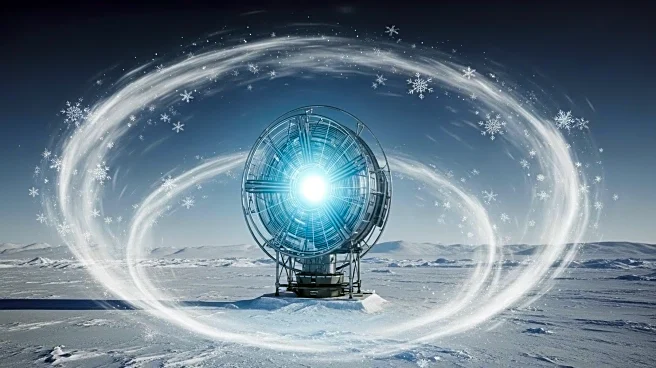What's Happening?
A recent study published in the journal Frontiers in Science has critically assessed various high-tech proposals aimed at saving the Arctic and Antarctic ice sheets. These proposals, known as polar geoengineering, include ideas such as giant underwater sea curtains and refreezing Arctic ice. The study, led by Martin Siegert, a glaciologist at the University of Exeter, concludes that none of these ideas are viable and may cause irreparable environmental damage. The report evaluated five prominent geoengineering proposals, including pumping seawater onto ice, scattering glass beads to increase reflectivity, and spraying sun-reflecting particles into the stratosphere. Each proposal was scrutinized for effectiveness, feasibility, risks, costs, and scalability, with the study finding that all would be environmentally dangerous.
Why It's Important?
The significance of this study lies in its potential impact on climate policy and geoengineering research. As the polar ice sheets continue to melt, contributing to sea level rise, there is increasing pressure to find solutions. However, the study warns that these geoengineering efforts could distract from the essential task of reducing carbon emissions. The report highlights the risks associated with these interventions, such as disrupting marine habitats and altering global climate patterns. The findings could influence policymakers and researchers to reconsider the focus on geoengineering and prioritize emission reduction strategies.
What's Next?
The study's conclusions may lead to a shift in research priorities and funding away from geoengineering projects. It could also spark debates among scientists and policymakers about the relative risks and benefits of such interventions. Some experts argue for continued research into geoengineering, given the severe environmental damage already occurring without it. The study may prompt further discussions on the governance and ethical implications of geoengineering, as well as the need for robust testing and evaluation of proposed methods.
Beyond the Headlines
The study raises ethical and governance concerns about geoengineering, emphasizing the need for careful consideration of the long-term impacts on fragile polar ecosystems. It also highlights the potential for these interventions to become a distraction from more sustainable solutions, such as reducing emissions. The report calls for a broader debate on the risks and benefits of geoengineering, suggesting that while these ideas may offer temporary relief, they do not address the root causes of climate change.











